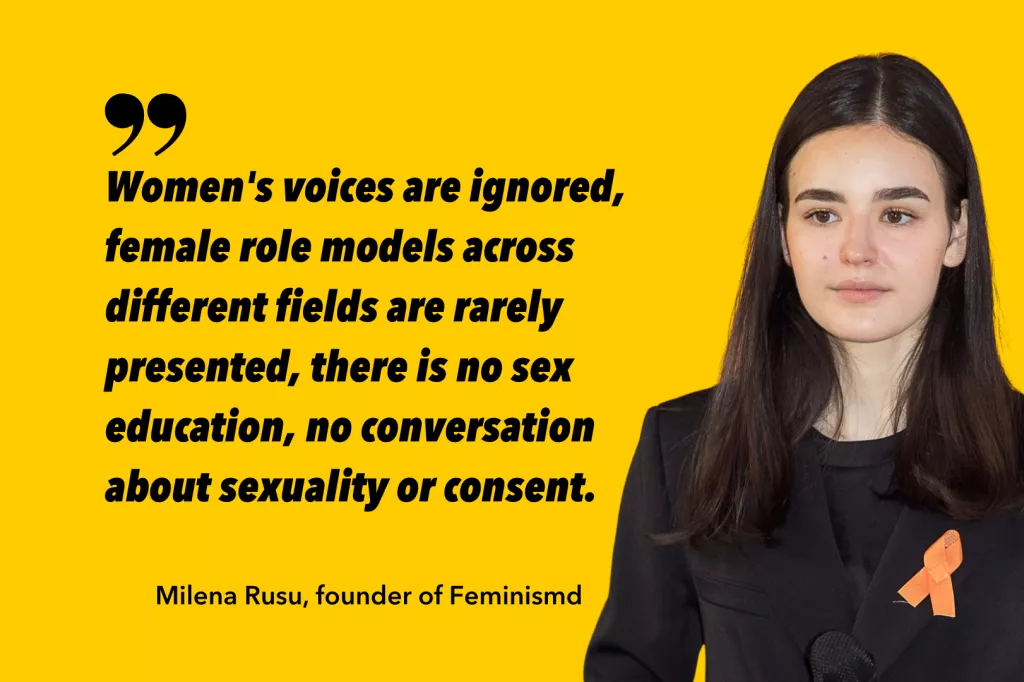Milena Rusu: It’s very important not just to combat sexism, but to prevent it

Tell me a bit about yourself and why you started Feminismd?
– It all started in May 2020, when I discovered the concept of feminism through social media. As I dug deeper into feminist content, I came across a live video featuring Moldovan activist Alina Cebotari. Alina mentioned the lack of resources about gender equality in Romanian and this was really my aha- moment. I knew I had to do something to change the situation. So, I created the Instagram account Feminismd and began sharing feminist resources in Romanian. To my surprise, the response from young people in Moldova was overwhelmingly positive. I got multiple requests to join and support from followers and other feminist organizations.
I opened an application process and recruited a team of 20 people. Together, we started creating even more feminist content focused on Moldova and Romania. Later we began organizing public events, and, starting in 2021, we have received funding for more complex projects and programs. Feminismd quickly became a full-fledged organization, receiving tens of thousands of dollars in funding while being completely teenage-led. It has been an amazing journey, and I'm grateful to have created a platform for young people to engage with feminist ideas and activism in Moldova.
What is it that you want to achieve with Feminismd?
– Firstly, Feminismd aims to build a community of feminist young people that uplift and support each other to push for change and be activists in society. I believe that collective efforts will help us make bigger strides toward achieving gender equality.
Secondly, Feminismd exists to educate people, especially young people, on the importance of gender equality and feminism. If a person grows up with sexist values reinforced by the society around them, once they reach adulthood with such beliefs, it can be incredibly hard to change their mindset. That's why we mainly target young people, teenagers who are still forming their character and personalities. By talking about gender equality and feminism in such a crucial period of one's development, we can have a greater influence and help them realize the importance of being equal and feminist. We believe it's very important not just to combat sexism, but to prevent it.
What do you think are the biggest challenges to gender equality in Moldova today?
– It's important to understand how interconnected different challenges are. No women's rights issue stands solitarily, however unrelated to other problems it may seem. But to answer your question, while there are lots of challenges to gender equality in Moldova, I believe the main one is the lack of gender-equitable education.
The Moldovan curriculum often perpetuates sexist, homophobic, and racist ideas. It is not built to encourage critical thinking. Books recommended for reading by the Ministry of Education often contain sexist and traumatizing content, such as visual descriptions of gender-based violence. Women's voices are ignored, female role models across different fields are rarely presented, there is no sex education, no conversation about sexuality or consent. The curriculum also fails to teach young people about Moldova's history of enslaving the Roma people. These are just some examples, and a big problem is that the Ministry of Education does not seem to want to make any changes, despite advocacy efforts and recommendations from international organizations such as OECD. Having these difficult discussions present in education is crucial for building a better society.
What are your plans for 8th of March?
– We hope to get involved in the National Feminist Festival which is organized by feminist NGOs in Moldova every year. This year is the 9th edition. At the festival, we hope to further advocate for gender equality with programming for youth. I urge all readers to follow us on Instagram at @feminismd, since that's where we will be posting all the announcements about our events, and where they can find many more resources about feminism in Moldova.
What do Swedish Council Presidency, Eastern Partnership, and civil society have in common?
Ognjen Radonjic, hub manager for our Eastern Europe office, together with Hugo von Essen from SCEEUS, shared shared their thoughts on the Swedish EU Presidency and the EaP on the podcast Talk Eastern Europe.
Andra nyheter

The power of people powered Public-Private Partnerships
Public–Private Partnerships (PPPs) are often discussed in terms of roads, power plants, housing, and other large infrastructure projects. But as discussed on the People’s Partnership Podcast, PPPs are...

ForumCiv’s social media accounts labelled as “extremist materials” in Belarus
Important message to our Belarusian followers. Any interaction with our content can now lead to legal consequences in Belarus. Please read the information below and take the necessary precautions for...

ForumCiv enters new strategic partnership
ForumCiv is proud to announce a new three-year strategic partnership with Sida, totalling SEK 137 million.